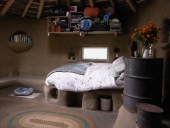The All You Need Institute is seeking fellows, collaborators, and partner(s). This post will focus on the collaborators.
For the original listing, please see
https://allyouneedinstitute.com/2020/08/fellows
Collaborators
All You Need Institute is Seeking Collaborators
All You Need is growing and we seek collaborators. Our primary qualification is that you desire to live and work and in “right relationship” with the earth, and commit to the journey that unfolds when we seek to understand what that means in late-stage capitalism. We embrace transparency, creativity and open-mindedness in our collaborations. We appreciate those who are prepared to talk frankly about taboo subjects like money or power. We know that many people hold a dream of deepening their relationship to the land and to nature through changing their work, so if this is you—we want to connect. Send us an email at
info@allyouneedinstitute.com and let us know what you’ve been visioning and what your interests are!
We have identified a variety of roles and/or areas of expertise that we think could be a great fit on the land or within the organization at this time:
Food Production Manager: Could incl., gardening, nursery, mushroom growing, herbal med maker, manage cows/goats/chickens etc, catering for events and to visitors
Land Mgmt: managing trails/fire lanes, prescribed burn assistance, integrating livestock for prescribed grazing, trapping and hunting, forestry and timber management, research and data collection, ecological restoration, securing grants for this work
Adventure/Nature Trip Coordinator: renting out kayaks and bikes, camping trips, camping gear, giving rides to put-in, or full tours for kayak, hiking, and biking trips
Event Coordinators/Community Outreach: marketing & booking events at the burrow, cultivate values-focused events that build networks of mutual aid and solidarity, community rep
If you have any of these skills and/or you already have a vision of how you would like to utilize your resources with the land to create more abundance while maintaining reciprocity and respect, email
info@allyouneedinstitute.com and let us know what you’re thinking.
We are currently prepared to offer a stipend and/or invest into the opportunities below if there’s a good fit. Just get in touch and let us know what your availability is by emailing
info@allyouneedinstitute.com
Administrative Partner
We are in need of an administrative partner and assistant to help us as we grow into a new stage of our organization. Individuals with experience administering retreat centers, land-based projects, collectives, etc, are especially encouraged to apply.
The right person will need to be comfortable in a unique workplace and the inherently personal nature of the work environment. You will be working directly with Jordan and Kezia, in a setting where you would be invited to assist us in setting priorities, making decisions about our public communications, and determining how to best uphold and administer our stated values and programing goals. Ideally, you’re a self-starter who’s excited about our mission, ready to keep us on our toes, and can maintain productivity in a flexible work environment.
Tasks Include:
Project prioritization and management
Updating website and Social Media accounts
Maintaining communication with members and participants
Attends and/or facilitates regular administrative meetings
Manages/updates institutional documents, policies, and public communications
Calendar management, Short – Long term planning
Budget planning and project management
Ideal Skills / Capacities:
Able to live on site//maintain regular relationship with the site
Flexible & precise
Stellar communication skills
Desire to explore long-term investment in the project
Connection to Gulf South region a plus
Understands permaculture, ecology, and related fields a plus
Trauma informed and understands varied spiritual and radical healing processes a plus
Experience challenging white supremacy, capitalism, and colonialism
Construction and Building
We are looking to fill positions in the realm of sustainable, permacultural, and alternative construction, as well as general maintenance. This could take the form of:
A fellow with basic skills and a willingness to learn
An experienced, project based contractor
A business partner to expand our offerings as an institution
You must have building skills and proficiency in a wide range of tools. You must be well organized, keep track of tools/materials, and maintain a tidy work area by the end of each day. Understanding of concepts such as moisture control, air flow, heat transfer and storage, wind resistance, load bearing, energy efficiency, water management, site assessment, “waste” management, and alternative materials and energy are a plus – though most of these are ideally handled by an architect. Basic understanding of architecture and civil engineering are a plus. The ability to read plans and to improvise, and experience with a variety of building methods, particularly traditional and ecologically sound ones, are necessary for paid work.
The ability to teach and showcase our work is an opportunity to earn income, as The All You Need Institute is primarily an education and retreat center. Videography skills could also help to expand our online offerings.
Sawmill experience is a major plus. We live on 111 acres of predominantly loblolly pine forest. Over the years I intend to remove all of them and replant with longleaf pine. For the right person this could be a business opportunity. Once our site becomes an ideal showcase of sustainable living, we imagine a separate business entity that offers contracting services for people wanting to live a similar lifestyle.




